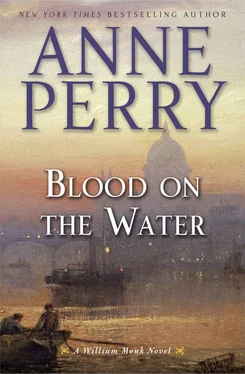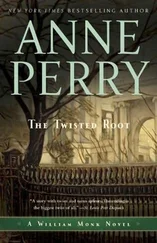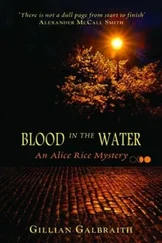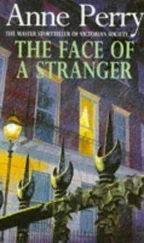Anne Perry - Blood on the Water
Здесь есть возможность читать онлайн «Anne Perry - Blood on the Water» весь текст электронной книги совершенно бесплатно (целиком полную версию без сокращений). В некоторых случаях можно слушать аудио, скачать через торрент в формате fb2 и присутствует краткое содержание. Год выпуска: 2014, ISBN: 2014, Издательство: Random House Publishing Group, Жанр: Исторический детектив, на английском языке. Описание произведения, (предисловие) а так же отзывы посетителей доступны на портале библиотеки ЛибКат.
- Название:Blood on the Water
- Автор:
- Издательство:Random House Publishing Group
- Жанр:
- Год:2014
- ISBN:978-0-345-54844-3
- Рейтинг книги:3 / 5. Голосов: 1
-
Избранное:Добавить в избранное
- Отзывы:
-
Ваша оценка:
- 60
- 1
- 2
- 3
- 4
- 5
Blood on the Water: краткое содержание, описание и аннотация
Предлагаем к чтению аннотацию, описание, краткое содержание или предисловие (зависит от того, что написал сам автор книги «Blood on the Water»). Если вы не нашли необходимую информацию о книге — напишите в комментариях, мы постараемся отыскать её.
Blood on the Water — читать онлайн бесплатно полную книгу (весь текст) целиком
Ниже представлен текст книги, разбитый по страницам. Система сохранения места последней прочитанной страницы, позволяет с удобством читать онлайн бесплатно книгу «Blood on the Water», без необходимости каждый раз заново искать на чём Вы остановились. Поставьте закладку, и сможете в любой момент перейти на страницу, на которой закончили чтение.
Интервал:
Закладка:
That was the last thing Pryor wished, and he was obliged to withdraw, angry and longing to have his revenge.
Hester wondered more urgently why Pryor seemed to care so much about this case. Watching him, hearing the emotion in his voice, she was convinced he fully intended to win. Even looking up at Sabri now and then, she had the same powerful feeling that he also expected Pryor to win. There was anger in his expression, contempt, jubilation when Pryor won a point, but very little fear.
The question and answer, attack and evasion continued all afternoon and into the next day, first with Monk, and then with other witnesses.
Pryor was willing, reluctantly, to grant that there had been errors of identification, but insisted they were honestly made. Ordinary, decent people were shattered and eager to identify those guilty.
“Of course they are not infallible,” he said passionately. “Which of us would be, in such circumstances? Please God, we will never have to find out. Do I have to paint the scene for you again?” He swung round from the jury to the gallery, imploring their comprehension, doing all he could to force them back into remembering all they had heard and imagined. He knew he dared not tell the story another time. He would lose them.
“They are good men,” he insisted. “Seeking not only some form of justice, but-perhaps even more importantly-to catch those who were responsible for this monstrous evil, and see that they can never do such a thing again.” Now he spoke specifically to the jury. “Would you not do the same? And could you swear that you would make no errors?”
Hester watched the jurors’ faces, and was overtaken with the cold fear that Pryor would win.
They needed more time. Could Rathbone think of some way in which Brancaster could drag out his cross-questioning of Pryor’s witnesses? At the very worst, if Pryor saw what he was doing, he would simply declare his case closed, and then there would be nothing anyone could do. The jury would deliberate, and that would be the end.
What would they conclude, as it stood now? Just what Pryor had implied: Good men had been fallible, overzealous, but not corrupt at heart. They had used desperate means, at times incorrect, but in order to convict the right man of a hideous crime. If Sabri were guilty as well, then they should punish him too. Mistakes have been made, but the right and just end had been achieved.
The law was safe after all.
And Pryor would be rewarded for that for the rest of his life. The sheen of victory was already in his face.
Brancaster had still established no motive for Sabri, just as Camborne had not for Beshara. The suggestion of revenge-nonspecific, unsubstantiated-was not enough this time around.
In defending Sabri, Pryor was also defending England, and the justice they believed had already been dispensed. How did you tell people something they did not want to know? What did you need to say to have them question the bedrock on which their beliefs of themselves were built?
Why the Princess Mary ? And-possibly even more importantly-why that night?
The next time there was a pause, Hester stood up and inched her way out of the row of seats where she had been. There was a sigh of relief as people eased a little, each taking a fraction more room, straightening a skirt.
As soon as she was in the hallway, she walked toward the entrance and out into the street. Her mind was already busy with the idea Monk had mentioned briefly the night the ferry was rammed and he so nearly drowned: the possibility that the whole ship had been sunk to be certain of killing one specific person.
Why would anyone do that? It was dangerous and terrible. There would be no excusing it. The reason must have been equally powerful. Especially if no one knew who had done it or why.
Where was the passenger list that Monk had obtained? He must have looked at it, stretched all the possible connections. But what had he been looking for? There had been plenty of wealthy people celebrating some private event, or simply having a highly enjoyable evening with friends, good food, and good wine.
Who should she ask?
She stepped to the curb and hailed the next hansom. She gave the driver the address of the Wapping Police Station. Orme would have the list, and he knew the situation was desperate.
CHAPTER 19
Hester found Orme very willing to show her the guest list for the party on the Princess Mary , and also the rest of the passenger manifest. It had been a long trip, all the way from Westminster Bridge to Gravesend and back again; so all places had been reserved, and names written down.
A great deal of work had already been done to identify most of the passengers and eliminate them from suspicion.
“What are you looking for, ma’am, exactly?” Orme asked as they sat together in Monk’s office. Monk was still in court, as she had known he would be, so at least for the moment, they were uninterrupted.
“I’m not sure,” she admitted. “I think it is possible that the Princess Mary was sunk not to have some kind of revenge, or create a political horror, but to kill one person …”
Orme could not conceal the look of disbelief on his face. “Who’d do a thing like that?” he asked, shaking his head.
“I don’t know. It’s just an idea William had, after he was hit by Sabri’s boat when he was on the ferry. It’s possible, isn’t it?”
“I suppose it is,” Orme agreed reluctantly. “But how would we find such a person? It could be anybody.”
She had been thinking about it on the omnibus while coming here.
“If you needed to get rid of someone, you would pick the best way you could to do it. One that was certain, and that did not make you a suspect. One that looked like an accident would be best, but if that were not possible, then at least one that hid your involvement in it.”
He pursed his lips, but nodded agreement. “This was no accident, but I see what you mean. With near two hundred dead, we don’t look for one that matters more than the others.”
“Exactly. We look for a really big motive, probably political, or with a lot of money involved, fortunes made or lost.”
“So how do we look for one?” he said grimly.
She had given that some thought also. “Someone who had to be killed this way because no better way was possible. And perhaps someone who had to be killed urgently, and was vulnerable right there and then.”
Orme began to smile. “I see. And it needed to be certain; so the person would have been at the party below deck. That must exclude a lot of people.”
“Also anyone who went as a last-minute decision,” she added.
He nodded his head. “The sinking must’ve taken planning. That dynamite stuff isn’t that easy to get hold of.”
“Where did it come from?” she asked quickly.
“Stolen from a quarry twenty miles away, we reckon.”
“Reckon?”
“You can’t tell one lot of dynamite from another. But there isn’t that much of it around.”
“So we can narrow it down by taking out all the people who were not at the party below deck because they wouldn’t be certain victims.” She winced a little at the thought. She was doing it logically, deducing the one intended victim as if she were speaking of something quite casual, not mass and indiscriminate death.
“We must think of who was vulnerable only this way,” she continued. “It was dangerous. Either Sabri was paid a lot, or else he cared about it enough to take the risk for his own reasons.”
“We looked at that,” Orme told her. “We couldn’t find any connection between Sabri and anyone on the Princess Mary .”
“I know,” she said quietly. “I’m only doing this because if we don’t find a motive I think Pryor’s going to win. Sabri will get off and the verdict against Beshara will stand. And, maybe even worse, whatever corruption or incompetence there was will be covered up, and for all we know, could happen again. And the very worst of it is that most other people will know it too. And when the law is held in disrespect, we don’t know what other things we trust may also fail.”
Читать дальшеИнтервал:
Закладка:
Похожие книги на «Blood on the Water»
Представляем Вашему вниманию похожие книги на «Blood on the Water» списком для выбора. Мы отобрали схожую по названию и смыслу литературу в надежде предоставить читателям больше вариантов отыскать новые, интересные, ещё непрочитанные произведения.
Обсуждение, отзывы о книге «Blood on the Water» и просто собственные мнения читателей. Оставьте ваши комментарии, напишите, что Вы думаете о произведении, его смысле или главных героях. Укажите что конкретно понравилось, а что нет, и почему Вы так считаете.












